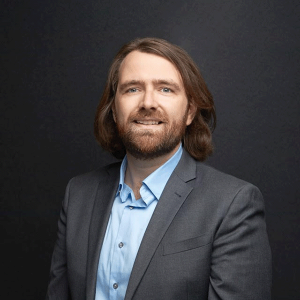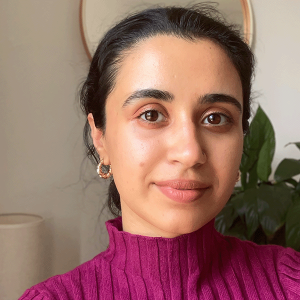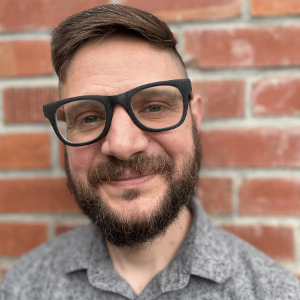Introducing New RS Faculty
This fall we welcomed several new faculty to our department, who are teaching a wide variety of subjects, including Asian religions and South Asian religions. In addition, Eugene Schlesinger was promoted. We are excited to have such an amazing group of faculty, who not only expand our course offerings but also introduce students to the study of religion. They are also excellent colleagues. We hope you enjoy learning a little bit more about them.

Nicholas holds an AB, summa cum laude, from Harvard College (2008), an MDiv from Harvard Divinity School (2014), and a Ph.D. in theology from Boston College (2024), where he was awarded the Donald and Hélène White Prize for Best Dissertation in the Humanities. Before coming to Santa Clara in 2024, he was Assistant Director of the Clough Center for the Study of Constitutional Democracy at Boston College. His scholarship and teaching is also informed by his 15 years of experience as a practitioner and teacher of community organizing. In that capacity, he was a key leader in the Greater Boston Interfaith Organization (GBIO) from 2013-2022 and a Research and Teaching Fellow in organizing at the Harvard Kennedy School from 2015-16; since 2013, he has remained an active organizing trainer and leadership coach with the global Leading Change Network (LCN). From the organizing tradition and the Catholic social tradition, Nicholas draws a deep commitment to cultivating the moral and political agency of others, and fostering a healthier civic life within the U.S. and beyond it.
Nicholas grew up in Michigan, and spent most of the last 20 years in Boston (apart from a year practicing Spanish and learning tango in Buenos Aires!). However, he was actually born in Palo Alto, and is excited to be returning to his Bay Area birthplace with his husband, Guadalupe Hayes-Mota, whose family lives in Southern California. In his spare time, he enjoys playing piano and organ, cooking, hiking, Crosswording, and spending time with friends and family.

Through archival work on colonial sugar plantation maps, ship logs, hydrographic charts, medical and immigration records, and missionary writings, she analyzes how religion was used to classify different groups of unfree laborers (including the formerly enslaved Black workers and indentured South Asian laborers of the Anglophone Caribbean) in 19th and early 20th centuries. Through ethnographic fieldwork among Madrasi healers, priests, priestesses, and drummers in Guyana and New York, however, Gaurika examines how the Madrasis themselves use religion in a very different way—to confront or (as the Madrasis say) “re-study back” their doubly diasporic histories. In addition to a monograph, Gaurika is working on an ethnographic documentary film on the history and perspectives of the Madrasi community.
Initially, Gaurika intended to focus on the Madrasis’ rituals of drumming, healing, and spirit possession. During her fieldwork in Guyana and Brooklyn, however, she discovered another major component of her interlocutors’ diasporic religion. In Guyana and Brooklyn, Madrasis live on the coastal edges of climate change, oil spills, and water pollution. Their religious ideas and practices are deeply entangled with their concerns for the environment. For this reason, Gaurika’s recent research has focused on the role of material oceans, especially the dark Atlantic, in shaping religious experiences. At this year’s meeting of the American Academy of Religion, Gaurika presented a paper outlining how material, historical, and endangered oceans shape diasporic religious histories and practices. This is also the subject of a forthcoming article.
Outside of her academic work, Gaurika enjoys hiking and painting. Over the last few years (before the documentary “Fantastic Fungi” came out on Netflix but after Anna Tsing’s anthropological monograph, The Mushroom at the End of the World (Princeton University Press, 2015)), Gaurika has been intrigued by wild mushroom foraging, spore printing, and learning about global underground fungi networks.

The author of four books and two dozen articles, he is currently at work on two major projects. The first is a theology of the liturgical calendar for pastoral ministers, which he hopes will fill a gap in the literature he's discovered while teaching in the Graduate Program in Pastoral Ministries. The second returns him to the ressourcement movement in order to put it into conversation with decolonial thought and theologies of liberation.
Having taught at Santa Clara since 2018, Gene is thrilled to begin his appointment as an Assistant Professor on the tenure track. He highly values teaching in both the undergraduate program and the Graduate Program in Pastoral Ministries, and hopes that his classes build upon students' native curiosity in order to open up possibilities for what Christianity and Christian theology can be that they'd never considered before.
He is also an inveterate nerd, enjoying overwrought board games and (equally overwrought) science fiction and fantasy literature, the filmography of David Lynch, and the music of Nine Inch Nails. He shares the love of games as well as a zeal for hiking and well-crafted cocktails with his wife, Loren. Their youngest child, Evelyn joins in the hiking and games with varying measures of enthusiasm. Their eldest, Joann, is serving in the Air Force.